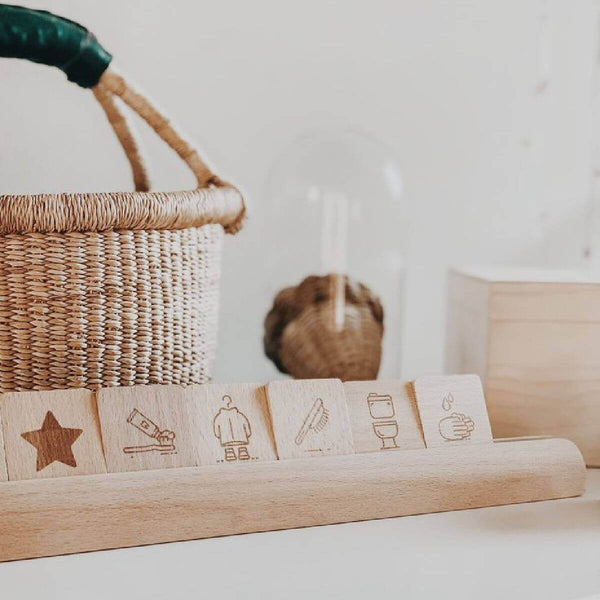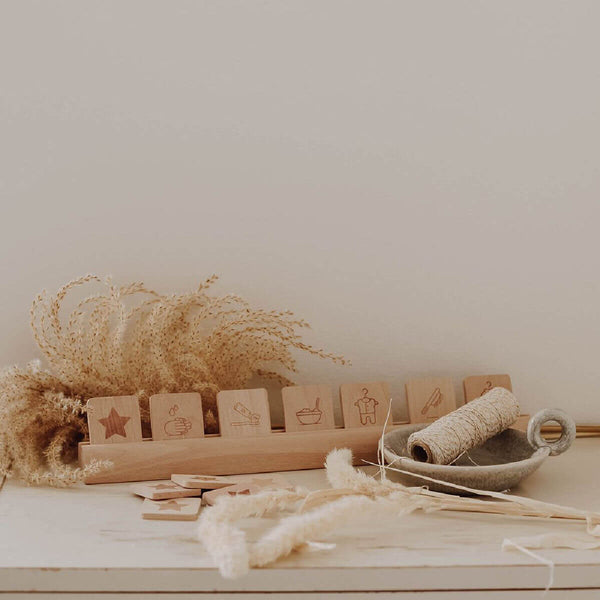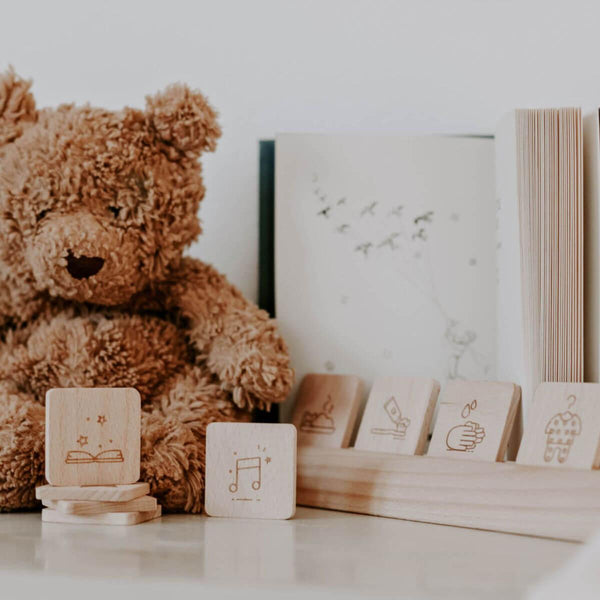Developing a Montessori routine can help to create an emotionally secure and independent environment in which your child can grow and learn. With a clearly-defined schedule, activities, and expectations, your children will have the framework they need to reach their full potential.

Creating a Harmonious Montessori Daily Routine for Your Toddler: Step-by-Step Guide -
Let's explore the principles of the Montessori method and how they can be applied to create a balanced and enriching daily routine for your little one. From morning rituals to structured playtime and peaceful bedtime rituals, we will cover it all. By incorporating the Montessori approach into your toddler's daily routine, you can foster independence, promote self-discipline, and encourage a love for learning. Whether you're a seasoned Montessori practitioner or simply curious about this educational philosophy, this guide will provide you with practical tips and strategies to make your toddler's day more engaging, organised, and enjoyable. So, let's dive in and discover how you can create a harmonious Montessori daily routine that sets the stage for your toddler's growth and development!
In the Montessori philosophy, routines are an integral part of a child's experience. They provide a framework within which children can explore, learn, and grow. Montessori routines are designed to be flexible, allowing for individual needs and interests to be accommodated while maintaining a sense of order and harmony. By embracing the Montessori approach to daily routines, you can create an environment that nurtures your toddler's independence, curiosity, and love for learning.
1. A Montessori-inspired daily routine offers numerous benefits for your toddler's growth and development. Firstly, it promotes independence. Montessori principles emphasise allowing children to do things for themselves, fostering a sense of self-reliance and autonomy. By incorporating this approach into your toddler's daily routine, you can encourage them to take responsibility for their own activities, such as dressing themselves, tidying up, and choosing their own activities. This not only builds their confidence but also strengthens their problem-solving and decision-making skills.
2. A Montessori-inspired routine encourages a love for learning. Montessori education is known for its emphasis on hands-on, experiential learning. By incorporating this approach into your toddler's daily routine, you can create opportunities for exploration, discovery, and self-directed learning. Through engaging activities and materials, your toddler can develop cognitive, motor, and social skills while having fun and cultivating a genuine interest in learning.
3. A Montessori-inspired daily routine promotes a peaceful and respectful environment. Montessori principles emphasize the importance of creating a calm and harmonious space for children to thrive. By establishing clear boundaries, providing consistent routines, and fostering a sense of order, you can create an environment that promotes respect, cooperation, and positive behaviour. This not only benefits your toddler but also contributes to a more harmonious family life.

Establish Goals for Each Part of the Day.
A Montessori routine should have a few simple goals at each part of the day, with plenty of time for learning activities. In the morning, focus on getting ready for school or work. During the middle of the day, provide opportunities for meaningful learning activities. In the evening, bring everyone together to socialise and talk about the day – fostering an emotionally secure atmosphere. At bedtime, make sure to give your children alone-time to relax before sleep.
Create A Balanced Breakfast.
An important part of creating a Montessori routine is leaning into the need for routine and offering balanced meals that fuel a productive day. Breakfast should include nutrient-rich choices, like fruits, whole grains, eggs, and nuts. Having a balanced breakfast also helps set the tone for the day to come in children’s minds – they will be ready to learn and energy throughout their day with the right food choices.
Design Independent Activities for the Day.
Once you have an ideal morning routine for your children, it’s important to create activities that allow them to learn more independently during the day. Think about ways to introduce activities and lessons that foster creativity, critical thinking skills, and underlying themes related to what they are interested in. Consider providing suitable materials, such as puzzles and worksheets, for them to spend time on during their day with you. This allows them to feel a sense of accomplishment as they finish each task independently without needing your help every step of the way.
Help Your Child Develop Self-Monitoring Skills.
Self-monitoring skills are important for children to help them stay on task and come back to their activities when distracted. To create a Montessori routine that helps your child develop self-monitoring skills, it’s important to provide clear instructions as well as firm but kind reminders to help your child keep track of how they are spending their day. While it is essential to observe and support them while they focus on a certain activity, it’s also important to step back when necessary and let them explore without too much interference.
Make Time for Restful Reading and Conversation
Winding down the day with a restful read-aloud session and some light conversation is essential in establishing a Montessori routine. It helps to create an emotionally secure environment while instilling healthy habits that can be continued into adulthood. Find time before bed or throughout the day to share stories from magazines, books, or online media sources. This calms the mind and can lead to more meaningful conversations about the content that was just shared.

Designing the perfect Montessori daily routine for your toddler
Now that we understand the importance and benefits of a Montessori-inspired daily routine, let's dive into the step-by-step process of designing the perfect routine for your toddler. Remember, every child is unique, so feel free to adapt these suggestions to suit your toddler's individual needs and preferences.
Step 1: Establishing a consistent wake-up timeTo create a peaceful morning routine, avoid rushing your toddler out of bed. Instead, allow them to wake up naturally or gently wake them up with soft music or a gentle touch. This promotes a calm start to the day and helps your toddler transition from sleep to wakefulness.
After your toddler wakes up, it's time to engage them in morning activities and self-care. Encourage your toddler to participate in simple tasks such as brushing their teeth, washing their face, and getting dressed. Provide child-sized materials and tools to promote independence and develop fine motor skills.
Incorporate activities that stimulate your toddler's senses and promote cognitive development. For example, you can set up a sensory table with various textured materials for them to explore or engage in open-ended play with blocks or puzzles. Remember to follow your toddler's lead and provide opportunities for them to make choices and follow their interests.
Outdoor play is an essential part of a Montessori-inspired daily routine. It allows your toddler to connect with nature, engage in physical activity, and develop gross motor skills. Incorporate regular outdoor playtime into your toddler's daily routine, whether it's a visit to the park, a nature walk, or simply playing in the backyard.
Provide open-ended materials such as balls, buckets, and shovels to encourage imaginative play and exploration. Allow your toddler to engage in unstructured play, where they can freely explore and interact with their surroundings. This promotes creativity, problem-solving skills, and a sense of wonder.
Independent play is a cornerstone of the Montessori philosophy. It allows toddlers to explore their interests, develop concentration, and practice problem-solving skills. Designate a space in your home where your toddler can engage in independent play with age-appropriate materials and activities.
Rotate toys and materials regularly to keep your toddler engaged and prevent boredom. Offer a variety of activities that promote different types of learning, such as puzzles, building blocks, art supplies, and sensory play. Encourage your toddler to choose their own activities and give them the freedom to explore and experiment.
Mealtime and snack routines are essential for establishing healthy eating habits and promoting independence. Create a designated eating area where your toddler can sit comfortably and enjoy their meals. Offer a variety of nutritious foods, and involve your toddler in meal preparation and serving whenever possible.
Encourage your toddler to participate in setting the table, pouring drinks, and serving themselves. Provide child-sized utensils and plates to promote independence and fine motor skills. Establish regular meal and snack times to create a sense of predictability and promote healthy eating habits.
Nap-time and rest periods are crucial for your toddler's well-being and overall development. Determine an appropriate nap schedule based on your toddler's individual needs and ensure they have a quiet, comfortable space for rest. Create a calming routine before nap-time, such as reading a book or singing a lullaby, to help your toddler wind down and transition to sleep.
During rest periods, provide quiet activities such as listening to calming music, looking at books, or engaging in quiet play. This allows your toddler to recharge and relax, promoting their emotional well-being and helping them maintain a balanced daily routine.
In the evening, it's important to establish a wind-down routine that prepares your toddler for a restful night's sleep. Create a peaceful and cozy environment in your toddler's bedroom, with dim lighting, soft bedding, and soothing decor.
Incorporate calming activities such as reading a bedtime story, cuddling, or practicing relaxation techniques like deep breathing or gentle stretching. Avoid stimulating activities or screen time close to bedtime, as these can interfere with your toddler's ability to fall asleep peacefully.
As your toddler grows and develops, their needs and interests will change. It's important to adapt the routine accordingly to support their ongoing growth and development. Observe your toddler's behaviour and interests, and make adjustments as needed.
For example, as your toddler becomes more independent, you can gradually increase their responsibilities, such as allowing them to pour their own drinks or dress themselves. Offer new and challenging activities to stimulate their cognitive and motor skills. As your toddler transitions to preschool, you can incorporate educational activities that support your little ones learning and social development.
Remember, flexibility is key. A Montessori-inspired routine should provide a balance between structure and freedom, allowing your toddler to explore and learn at their own pace while maintaining a sense of order and predictability.

Implementing a Montessori-inspired daily routine may come with its own set of challenges. Here are some common issues you may encounter and how to address them:
1. **Resistance to transitions**: Toddlers can sometimes resist transitions between activities. To ease the transition, provide visual cues such as a timer or a picture schedule. Use gentle reminders and give your toddler a few minutes of warning before transitioning to the next activity.
2. **Lack of interest in independent play**: If your toddler seems disinterested in independent play, try introducing new materials or rotating toys more frequently. Observe their interests and provide activities that align with their current fascinations.
3. **Mealtime struggles**: If your toddler is a picky eater or struggles with mealtime routines, involve them in meal preparation and offer a variety of nutritious options. Make mealtimes enjoyable by creating a relaxed atmosphere and modeling healthy eating habits.
4. **Resistance to nap-time or bedtime**: If your toddler resists nap-time or bedtime, establish a consistent wind-down routine that signals the transition from playtime to rest. Provide comfort and reassurance, and avoid stimulating activities close to bedtime.
Remember, every child is different, and it may take time for your toddler to adjust to a new routine. Be patient, stay consistent, and celebrate small victories along the way.
Incorporating the principles of the Montessori method into your toddler's daily routine can have a profound impact on their growth and development. By establishing a harmonious routine that balances structure and freedom, you can foster independence, promote self-discipline, and encourage a love for learning.
Through consistent wake-up times, engaging morning activities, outdoor play, independent play and learning, mealtime and snack routines, nap-time and rest periods, and a peaceful bedtime routine, you can create a nurturing environment that supports your toddler's physical, cognitive, and emotional well-being.
Remember, a harmonious Montessori daily routine is not about rigidly following a set schedule, but rather about creating an environment that allows your toddler to explore, learn, and grow at their own pace. Embrace the benefits of the Montessori philosophy, adapt the routine as your toddler grows, and enjoy the journey of creating a harmonious daily routine that sets the stage for your toddler's lifelong love for learning.




